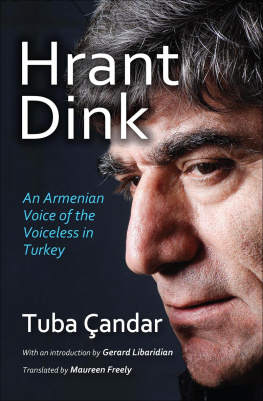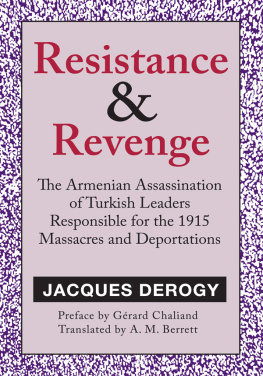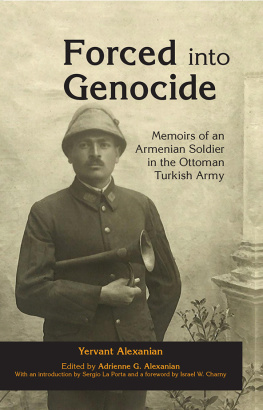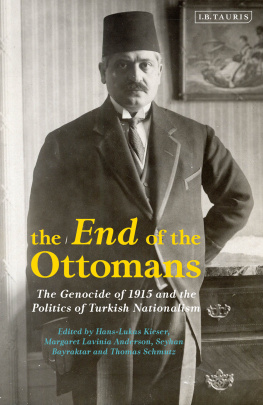
THE KNOCK AT THE DOOR

THE KNOCK AT THE DOOR
A Journey Through the Darkness of the Armenian Genocide
Margaret Ajemian Ahnert

Copyright 2007 by Margaret Ajemian Ahnert
FIRST EDITION
All rights reserved. No part of this book may be reproduced in any form or by any
electronic or mechanical means, including information storage and retrieval
systems, without permission in writing from the publisher, except by a reviewer who may quote brief passages in a review.
Library of Congress Cataloging-in-Publication Data
Ahnert, Margaret Ajemian.
The knock at the door : a journey through the darkness of the
Armenian genocide / Margaret Ajemian Ahnert.
p. cm.
ISBN 978-0-8253-0512-2 (alk. paper)
1. Armenian massacres, 1915-1923 Personal narratives. 2. Ajemian, Ester
Minerajian, b. 1900. 3. Ahnert, Margaret Ajemian. 4. Armenian-Americans
Biography. I. Title.
DS195.5.A385 2007
956.620154 dc22
[B]
2006101535
DISCLAIMER
Although there is a great deal of information available to the general public concerning the Armenian genocide, the stories told herein are based solely on the memories of my mother, who lived through it. As a result of the horrific events that took place and the lack of documentary evidence, a great deal of my mothers stories cannot be specifically verified. In addition, some names and characteristics of individuals have been changed or altered. Over the years, I took notes and made recordings of her stories. Even through she repeated these stories many times, she never altered the details. The stories in this book are the stories she told me in her limited English. The words and the voice in the stories are mine.
Endpaper map produced by the Armenian National Institute (ANI) (Washington, D.C.) and the Nubarian Library (Paris). ANI, English Edition Copyright 1998.
Published in the United States by Beaufort Books, New York
www.beaufortbooks.com
Distributed by Midpoint Trade Books, New York
www.midpointtradebooks.com
10 9 8 7 6 5 4 3 2 1
PRINTED IN THE UNITED STATES OF AMERICA

This book is dedicated to my mother, Ester,
the most courageous person Ive ever known,
whose recollections and vivid memory
helped me write this book.
Her voice is with me still.

For God shall bring every work into judgment,
with every secret thing,
whether it be good,
or whether it be evil.
Ecclesiastes 12:14

CONTENTS
ONE
A PAPER CROWN
TWO
EARLY MEMORIES
THREE
THE BRIDE HAS NO UNDERWEAR ON
FOUR
GROWING UP IN AMASIA
FIVE
THE DAY MY FATHER DIED
SIX
SIGNS OF UNREST
SEVEN
THE ETERNAL FLAME
EIGHT
THE KNOCK AT THE DOOR
NINE
THE EVIL EYE
TEN
BOUD-A-GETCHERE
ELEVEN
ROCKAWAY BEACH
TWELVE
LIFE WITH SHAMIL
THIRTEEN
EAGLE ON A PERCH
FOURTEEN
THE ESCAPE
FIFTEEN
DINNER WITH A TURK
SIXTEEN
JOURNEY TO AMERICA

PROLOGUE
My mother wanted me to marry an Armenian, and I did. His name was Steve, a kind, gentle young man. Although I did grow to love him, the choice was not mine. In those days the 1950s I dared not disappoint my mother, who, in the end, wanted only one thing from me that I marry an Armenian and carry on our bloodline. People say blood is thicker than water, and I know this to be literally true. Water is just plain old hydrogen and oxygen, but blood its packed with platelets, proteins, and DNA.
Im in my fifties now, remarried with two beautiful children and two grandchildren who know little of the history and the genocide their great-grandmother survived.
Their great grandmother, my mother, Ester, was only 15 when the Armenian Genocide began. More than one million Armenians were killed by the end of it.
Mother is dying now. So am I, I suppose. As I age, I get all the expected ailments. The other day, the doctor diagnosed me with a mostly benign condition of what else the blood. My blood has too many platelets in it, raising my stroke risk. Now I must take two tiny pink aspirin every day. I dont mind. I like to think I have too much blood, and that I am brimming with my mother, and me, and all we carry, together.
Ester, my father Albert, Steve, and George, my high school sweetheart the one I didnt marry and all the people I know through my mothers stories they all come crowding back in my thoughts when I bike or walk in an area called The Pines. A dirt road surrounded by tall pine trees, The Pines is a special place on the tiny island of Bimini off the Florida coast, where my husband Bob and I like to fish.
Some scholars say the lost continent of Atlantis lies beneath the island and that Bimini may be one of its mountain peaks. Whatever it is, when Im near The Pines, I feel an energy, a sense of presence, churchlike, holy. I cannot explain.
Sometimes, when Im there, I talk out loud to my father, who died when I was thirteen. I remind him of the question I asked him as a child. Why dont I have any aunts or uncles or cousins like the other kids in school? Why, one of my friends even had a cousins club with three hundred members. I didnt have a single relative on either my fathers or my mothers side. As a child, Papa ignored my question with the simple word, mortseer! But how could I forget what I never knew? I tell my father, Now, I know.
It wasnt until I was seventeen and first read Franz Werfels The Forty Days of Musa Dagh, an account of one Armenian villages stand against the Turkish army, that I started to understand. I was working as a secretary at a Wall Street brokerage firm. At noon each day Id stroll the short distance up Wall Street to Broadway and enter the Trinity Church graveyard. I carried my lunch and Werfels book in a brown paper bag. I ate alone.
Sitting on a stone grave marker in the shape of a colonial chair, I ate my lunch and immersed myself in my heritage. I devoured Werfels book while the passing parade of bankers and moneymaking wizards hurried to their next deal. I sat quietly amongst the dead, unnoticed.
As I read, the characters came alive for me. The Bagradians, central figures in Werfels novel, were uprooted and persecuted by the Turks, as Mother and her family had been. It was a family by the name of Bagradian who took in Mother. I wondered, could they be related?
The characters in fact, the entire novel disturbed the Turkish government so much that in 1935, when Metro-Goldwyn-Mayer announced it was making a film of the novel, the Turkish ambassador asked the U.S. secretary of state to block the release of the film. It was never produced.
Reading this book changed my life. I began to ask about the dark time, a time my mother had lived through and tried to forget.
Next page







